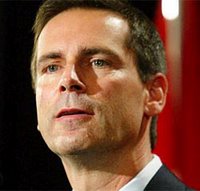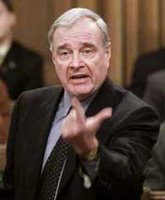
Well, we're on the cusp once more of an election campaign, and judging from the analysis and the pre-writ rhetoric, it's on track to be even nastier than the last one. Charming. I imagine that what will likely happen is that the Liberals will win another slim minority, perhaps an even smaller one than they currently have, and we'll be back into another few months or a year of minority government rigmarole and electioneering. Rather than getting into a debate over the likelihood of that outcome, though, I want to write about the alternative outcome that I feel would be much better for Canada and for the LPC: a Conservative government.
I believe fundamentally in the principles and values of the Liberal Party, and volunteered extensively with my local LPC candidate in the 2004 election. I'll likely vote Liberal in this upcoming election, as well - but a Conservative government wouldn't be as bad a thing as many Liberal pundits and activists would like to suggest. A
Stephen Harper government would not turn back decades of Liberal accomplishments, and it would be great for Canadian democracy and the long-term prognosis of the success of the LPC.
First of all, regarding what a Conservative government would do in Ottawa. Some partisans cry that he would dismantle public health care, criminalize abortion and otherwise destroy this nation's social fabric along with facilitating the separation of Quebec. I'll deal with these one by one. Regarding health care - think about the fact that Harper would have, at best, a minority government with which to work with, and passing such significant health care reform would be near impossible with all other Opposition parties likely voting against such a plan. And if you want a strong defender of public health care, are you really that enamored with
Paul Martin? I know I'm not. On the other hand, we do need a degree of innovation in our health care system - unless we can find billions upon billions of dollars more, it's going to keep declining. Instead of more rhetoric and little action from Paul Martin, why not try something new? Harper likely wouldn't be able to make drastic changes, as I've mentioned, so we'd probably end up with a degree of innovation in health care, which'd be great. On abortion - Harper would have a minority, and he knows that any attempt to move against abortion would torpedo his chances of getting elected ever again. Case closed. On national unity - Harper knows, I think, that to preside over the breakup of the country would be disastrous, and I think he wants a united Canada as much as I do. He might not be an ideal defender of federalism, but look at what we've got right now. Ministers who call PQ Premiers of Quebec "losers", and a PM whose strongest argument for unity is that a sovereign Quebec would not be economically-viable (despite the fact that some of the strongest economies in the world are about that size or smaller)? Not to mention the whole sponsorship cloud that will hover over this Liberal reign until there's an interregnum of sorts. Furthermore, Paul Martin's assymetrical federalism, signing side deals with all of the provinces on different terms, in order to keep the country together? Not my idea of a strong defender of federalism. So I think we can rest assured that a minority Conservative government isn't going to dismantle everything that has been accomplished under Liberal rule - and you know what? A fresh look on the problems of the day from an outsider's perspective isn't necessarily a bad thing.
On Canadian democracy - you know, the same party has been in power since 1993. Consecutive majorities until last year. So many Canadians are becoming disillusioned with a system that continues handing victories to the Liberals. A shake-up would be a good breath of fresh air for a system in which voter turnout is in perpetual decline. A
de facto one-party state democracy is no good.
Finally, on the benefits of a Conservative government for the LPC. Yes, Paul Martin would have to go - if you're a big Martin fan, you'll be disappointed with this no matter what. But let's be frank, here - the party is a juggernaut, a massive electoral machine that's been in power for a good 12 years straight, and I think it's fair to say that we're running out of steam. Starting to scrape the bottom of the barrel in terms of ideas. There are some members of the party who are starting to play the appropriate roles in a "culture of entitlement". None of that is any good at all. If the LPC wins the election, we get another year or so of Paul Martin, saying anything and everything, wandering all over the map in terms of policy, lacking any grand idea or vision for the country. The country, and Quebec in particular, gets more and more disappointed in a lack of federal leadership. The "culture of entitlement" about which Mr Harper speaks continues to set in.
A Conservative victory gives our party a chance to do some soul-searching and some bloodletting. It gives us a chance to reinvigorate ourselves with a leadership race that's about ideas, a chance to find a candidate who can put the divisions of the Chretien/Martin era behind us. It's a chance to learn from our 12 years in power, and to build a comprehensive and long-term vision for this country's future. This is going to be another election fought on corruption, no doubt - if we come back to the following election with a blueprint for the nation, a new, baggage-less leader and a more humble approach, we can return to the Government with new energy and ideas to put to use to govern the country.
That's why a Conservative victory wouldn't be the end of the world, and would in fact set the stage for better Canadian governance in the future with the hand of the LPC on the rudder.
 It's likely, that in the crush of news and punditry about the Canadian election and President George W Bush's woes over Iraq, the fact that tomorrow, 1 December, is World AIDS Day 2005 will be forgotten. Each minute that is spent quarreling over the candidacy of Michael Ignatieff or which party leader loves Canada more sees 5 people die of AIDS. That means that the pandemic is claiming over 8 000 lives each day. 40.3 million people are currently living with HIV and AIDS. Nearly 65% of those, or 25.8 million, live in Sub-Saharan Africa. To date, 23.1 million people have died of AIDS - and the numbers keep growing.
It's likely, that in the crush of news and punditry about the Canadian election and President George W Bush's woes over Iraq, the fact that tomorrow, 1 December, is World AIDS Day 2005 will be forgotten. Each minute that is spent quarreling over the candidacy of Michael Ignatieff or which party leader loves Canada more sees 5 people die of AIDS. That means that the pandemic is claiming over 8 000 lives each day. 40.3 million people are currently living with HIV and AIDS. Nearly 65% of those, or 25.8 million, live in Sub-Saharan Africa. To date, 23.1 million people have died of AIDS - and the numbers keep growing.






























